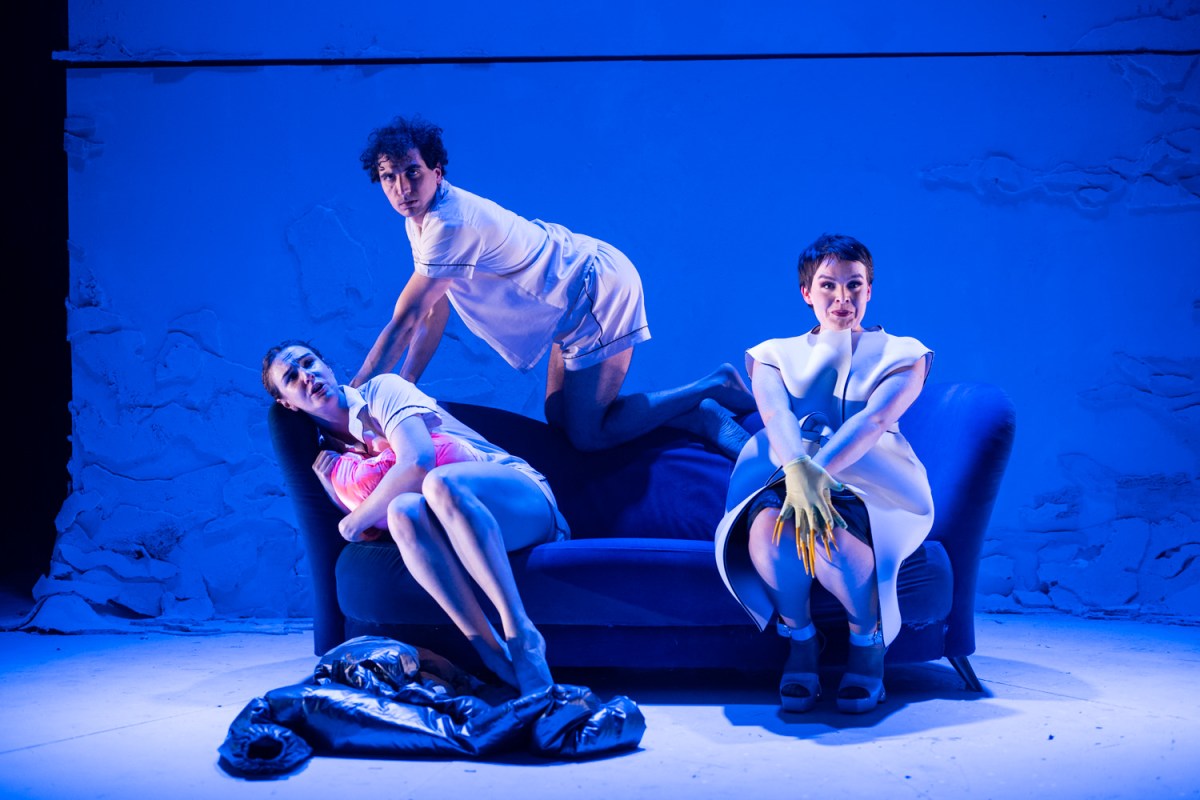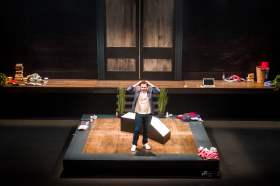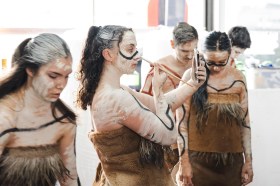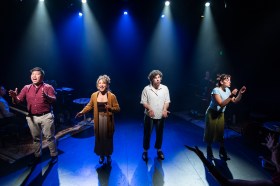When Susan Sontag wrote Notes On Camp it was still cutting edge to argue that art had value beyond the good, or more particularly, the bad. Now camp art, art that pokes fun at itself or at the standards of taste, conduct, and skill involved in ‘good’ art, is mainstream, and nowhere more than in Australian culture.
Melbourne’s many small theatre companies incubate art that brings camp to mass audiences traditionally associated with high culture. This has been the case since David Williamson’s cutting edge sensibilities were gracing the stage in the 1980s. It has been the case in Theatre Works in St Kilda since Hannie Rayson was writing about Pauline Hanson, the Costello brothers, and the difficulty of retaining youthful friendships into middle age.
Even the Theatre Works branding is camp. A number of years ago, the heritage theatre company introduced a hot pink logo, a neon sign, and an edgy but laidback atmosphere that appeals to the beachy and bohemian set. They describe themselves as ‘an artist-first’ organisation that supports both emerging and established artists. Stephen Mitchell Wright, the director, said in an artist’s statement he has been working with the play since 2001 and chose to tell it from the perspective of Medea’s children.
Thus Medea: Out of The Mouths of Babes has a bold perspective but is not always clear. The prevailing production style is camp, tongue-in-cheek, and in true camp fashion, the atmosphere is sometimes too much. The juxtaposition of dramatic acting with multiple TV screens, of a classically Greek tale with a postmodern news channel, the appearance of a psychic and the layering of Medea’s monologues over children’s drawings, creates a production that dilutes the power of the children’s witnessing to the adults’ struggle with status and loss of status.
Despite a commitment to the perspective of the children, the inclusion of a wedding video and numerous soliloquies muddy the waters as to whose perspective the story is being told from.
Instead of a reimagining that involves the children in every scene, there’s a composite approach by a group of writers, video artists, and designers that juxtaposes children’s drawings with what might be pictures of the expanding universe, wedding videos with classical Greek reported speech, security camera video with German cabaret. The effect is of a series of sketches based on Medea than a re-telling from the perspective of the children. We open with cabaret, then a psychic segment, followed by a domestic drama mixing children’s games with Medea’s perspective.
There are some quite good classical acting despite the camp sensibility. Paolo Bartholomei’s Jason is amiably arrogant and convincingly crushed by his children’s murder. Emily Joy is the most moving as an ageing nurse who must leave the broken household and, in a reminder of the terrible patriarchal conditions of ancient Greece, ‘find a quiet place to die.’ And Willow Sizer gives glimpses of a good, grounded Medea, despite a distracting costume that undercuts the pathos of the performance.
It would be churlish to call this anything other than a fun night at the theatre with a good grasp of craft on display, and the audience enjoyment was certainly more in evidence than at many other productions I’ve seen. But Medea: Out of the Mouths of Babes also displays the dilemmas of the independent theatre company in an art starved age.
By drawing on such a large pool of talent, it is sometimes difficult to arrive at a clear sensibility. In the absence of such, be it serious or sarcastic, the whole enterprise of art is mocked. Instead theatre-makers take refuge in a mass culture attempt at camp that isn’t really camp: a piled on aesthetic that in saying too much, risks not saying anything at all.
Read: Dance review: Jagad
In this sense, Medea: Out of The Mouths of Babes does not feel like Greek tragedy but Italian television: the comedy is pervasive and the tragedy exists to energise the audience, not to explain the characters. Knowingly, the production winks at this kind of television in the first act, when it reports Medea’s murder on ‘a serious news show’. Inadvertently, this dramaturgical decision raises more questions about the nature of news production than the tragic nature of Greek humanism. While important, it feels like a missed opportunity.
Medea: Out of The Mouths of Babes
Theatre Works, Melbourne
Director: Steven Mitchell Wright
Writing contributions: Chris Beckey, Steven Mitchell Wright, Ian Johnson
Video artist: Chris Bennett, Underground Media (he/him)
Designer: Hahnie Goldfinch
Lighting Designer: Ben Hughes
Sound Composition: Rachel Lewindon
Stage and Production Manager: Holly Anderson
Tech Manager: Tom Ray
Assistant Director: Belle Hansen
Cast: Paolo Bartolomei, Emily Joy, Willow Sizer
Tickets: from $20
Medea will be performed until 20 August 2022





